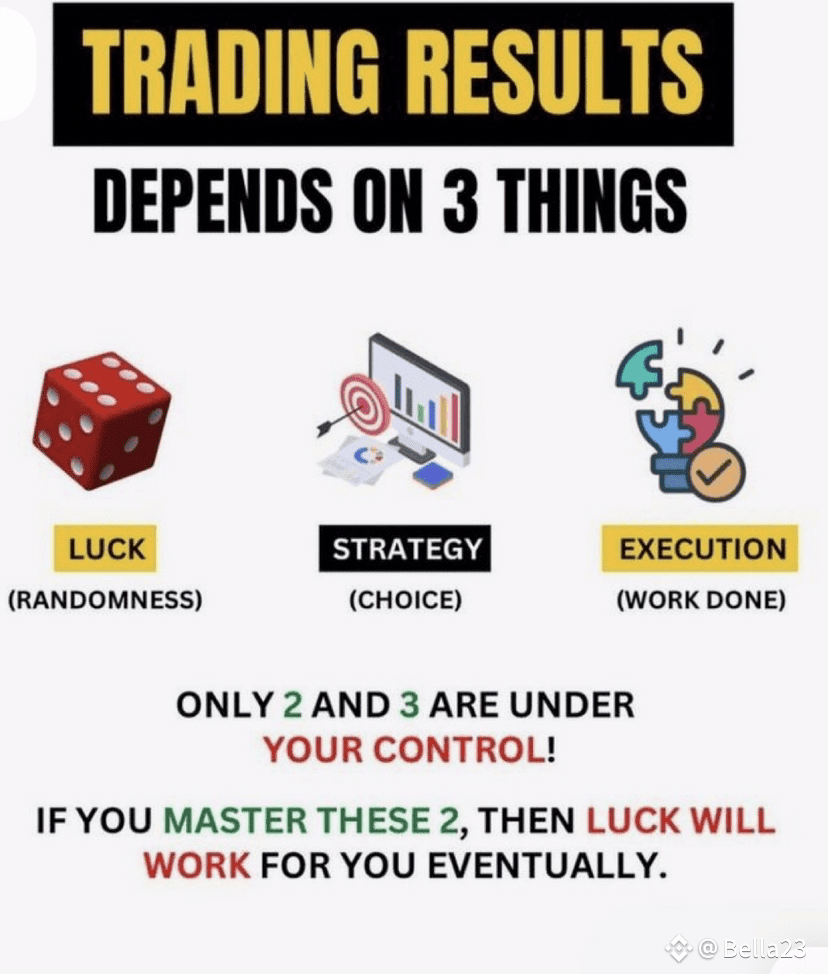Trading in financial markets is a complex endeavor that can yield significant rewards or substantial losses. While many traders focus on developing sophisticated strategies, the reality is that trading results are influenced by three critical factors: luck, strategy, and execution. Understanding the interplay between these elements can help traders improve their performance and manage their expectations.
1. Luck: The Unpredictable Element✨✨
🔷Luck plays an undeniable role in trading outcomes. Markets are influenced by a myriad of unpredictable factors, including economic data releases, geopolitical events, and sudden market sentiment shifts. Even the most well-researched trades can be adversely affected by unforeseen circumstances.
For instance, a trader may have a solid strategy based on technical analysis, but if a major news event occurs that impacts the market unexpectedly, the results can deviate significantly from the anticipated outcome. While luck cannot be controlled, traders can mitigate its impact by diversifying their portfolios and employing risk management techniques.
2. Strategy: The Blueprint for Success🎯
A well-defined trading strategy is essential for consistent performance. This strategy should be based on thorough research and analysis, incorporating both technical and fundamental factors. Traders often utilize various approaches, such as day trading, swing trading, or long-term investing, each with its own set of rules and risk profiles.
Key components of a successful trading strategy include:
🔹Market Analysis: Understanding market trends and conditions.
🔹Entry and Exit Points: Defining when to enter and exit trades based on specific criteria.
🔹Risk Management: Setting stop-loss orders and position sizes to protect capital.
A robust strategy provides a framework for decision-making, helping traders navigate the complexities of the market. However, even the best strategies can fail if not executed properly.
3. Execution: The Art of Implementation💥
Execution refers to the process of carrying out trades according to a predefined strategy. This aspect is often overlooked, yet it is crucial for achieving desired trading results. Poor execution can lead to slippage, missed opportunities, and emotional decision-making, all of which can erode profits.
Factors that influence execution include:
🔸Timing: Entering and exiting trades at the right moment is vital. Delays can result in missed opportunities or unfavorable prices.
🔸Order Types: Utilizing the appropriate order types (market orders, limit orders, etc.) can enhance execution efficiency.
🔸Emotional Discipline: Maintaining composure during volatile market conditions is essential for sticking to a trading plan.
Traders must continuously refine their execution skills, as even the best strategies can falter without proper implementation.
Conclusion
In conclusion, trading results are a product of luck, strategy, and execution. While luck is an uncontrollable factor, traders can enhance their chances of success by developing a solid strategy and honing their execution skills. By recognizing the importance of each element and striving for improvement, traders can navigate the complexities of the financial markets more effectively. Ultimately, a balanced approach that acknowledges the role of luck while emphasizing strategy and execution will lead to more consistent trading results.

